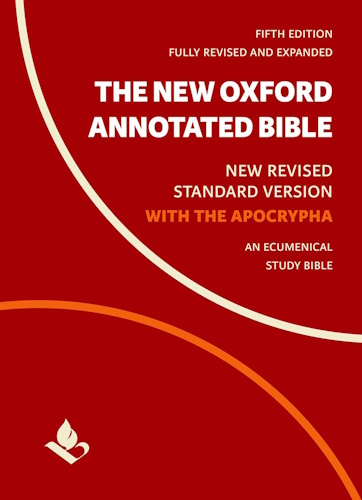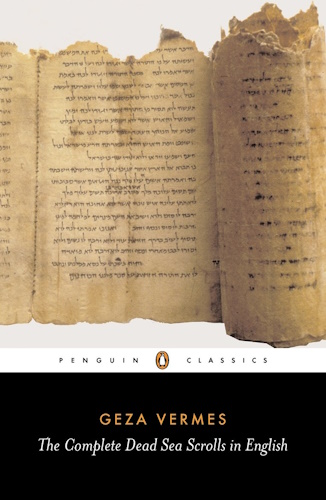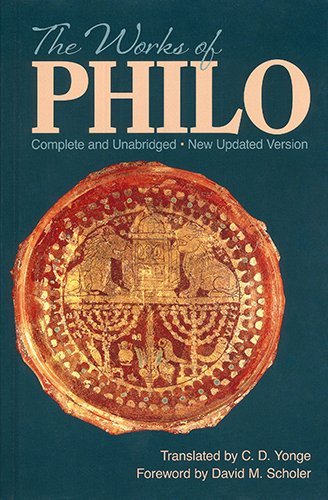
ON PROVIDENCE (Fragment I)
From Eusebius P. E. 7.21.336bÐ337a
But that you may not think that I am here arguing in a sophistical manner, I will produce a man who is a Hebrew as the interpreter for you of the meaning of the scripture; a man who inherited from his father a most accurate knowledge of his national customs and laws, and who had learnt the doctrines contained in them from learned teachers; for such a man was Philo. Listen then, to him, and hear how he interprets the words of God.
Why, then, does he use the expression, "In the image of God I made Man,"{1}{#ge 1:27.A.} as if he were speaking of that of some other God, and not of having made him in the likeness of himself? This expression is used with great beauty and wisdom. For it was impossible that anything mortal should be made in the likeness of the most high God the Father of the universe; but it could only be made in the likeness of the second God, who is the Word of the other; for it was fitting that the rational type in the soul of man should receive the impression of the Word of God, since the God below the Word is superior to all and every rational nature; and it is not lawful for any created thing to be made like the God who is above reason, and who is endowed with a most excellent and special form appropriated to himself alone.
This is what I wish to quote from the first book of the questions and answers of Philo.
And the Hebrew Philo, in his treatise on Providence, speaks in this way concerning matter.
But concerning the quantity of the essence, if indeed it really has any existence, we must also speak. God took care at the creation of the world that there should be an ample and most sufficient supply of matter, so exact that nothing might be wanting and nothing superfluous. For it would have been absurd in the case of particular artisans, for them, when they are occupied in making anything, and especially anything of much value, to calculate the exact quantity of materials which they require; but for that being who is the original inventor of numbers and measures, and the qualities which exist and are found in them, to omit to take care to have just what was proper. I will speak now with all freedom, and say that the world had need for its fabrication of some precise quantity of materials, neither more nor less; since otherwise it would not have been perfect, nor complete in all its parts, being thoroughly well made, nor would it have been made perfect of a perfect essence.
For it is an indispensable part of a workman who is thoroughly well skilled in his art, before he begins making any thing, to see that his materials are exactly sufficient; therefore a man, even if he were most eminently skilled in the knowledge of other things, still if he were not able altogether to avoid error, which is so natural to mortals, would be very likely to be deceived in respect of the quantity of materials which he required when he was about to proceed to the exercise of art; sometimes adding to it as too little, and sometimes taking away from it as too much. But that Being who is, as it were, a kind of fountain of all knowledge, was not likely to supply anything in deficient or in superfluous quantities, inasmuch as he employs measures elaborated in a most wonderful manner, so as to display perfect accuracy, and all of the most praiseworthy character. But he who is inclined to talk nonsense, at random, will easily do it, looking upon the different works of all artisans as causes, and as having been made in a more excellent manner, either by the addition or by the subtraction of some material or other. But it is the peculiar occupation of sophistry to quibble and cavil; while it is the task of wisdom to investigate accurately everything that exists in nature.
![]()
![]()
Disclaimer:
Some material presented will contain links, quotes, ideologies, etc., the contents of which should be understood to first, in their whole, reflect the views or opinions of their editors, and second, are used in my personal research as "fair use" sources only, and not espousement one way or the other. Researching for 'truth' leads one all over the place...a piece here, a piece there. As a researcher, I hunt, gather and disassemble resources, trying to put all the pieces into a coherent and logical whole. I encourage you to do the same. And please remember, these pages are only my effort to collect all the pieces I can find and see if they properly fit into the 'reality aggregate'.
Personal Position:
I've come to realize that 'truth' boils down to what we 'believe' the facts we've gathered point to. We only 'know' what we've 'experienced' firsthand. Everything else - what we read, what we watch, what we hear - is what someone else's gathered facts point to and 'they' 'believe' is 'truth', so that 'truth' seems to change in direct proportion to newly gathered facts divided by applied plausibility. Though I believe there is 'truth', until someone representing the celestial realm visibly appears and presents the heavenly records of Facts And Lies In The Order They Happened, I can't know for sure exactly what "the whole truth' on any given subject is, and what applies to me applies to everyone. Until then I'll continue to ask, "what does The Urantia Book say on the subject?"
~Gail Bird Allen
![]()
![]()
-
Urantia Book, 44:0.11 - The Celestial Artisans
Never in your long ascendancy will you lose the power to recognize your associates of former existences. Always, as you ascend inward in the scale of life, will you retain the ability to recognize and fraternize with the fellow beings of your previous and lower levels of experience. Each new translation or resurrection will add one more group of spirit beings to your vision range without in the least depriving you of the ability to recognize your friends and fellows of former estates.
-
Princess Bride 1987 Wallace Shawn (Vizzini) and Mandy Patinkin (Inigo Montoya)
Vizzini: HE DIDN'T FALL? INCONCEIVABLE.
Inigo Montoya: You keep using that word. I do not think it means what you think it means. -
Urantia Book, 117:4.14 - The Finite God
And here is mystery: The more closely man approaches God through love, the greater the reality -- actuality -- of that man. The more man withdraws from God, the more nearly he approaches nonreality -- cessation of existence. When man consecrates his will to the doing of the Father's will, when man gives God all that he has, then does God make that man more than he is.
-
Urantia Book, 167:7.4 - The Talk About Angels
"And do you not remember that I said to you once before that, if you had your spiritual eyes anointed, you would then see the heavens opened and behold the angels of God ascending and descending? It is by the ministry of the angels that one world may be kept in touch with other worlds, for have I not repeatedly told you that I have other sheep not of this fold?"
-
Urantia Book, Foreword - 0:12.12 - The Trinities
But we know that there dwells within the human mind a fragment of God, and that there sojourns with the human soul the Spirit of Truth; and we further know that these spirit forces conspire to enable material man to grasp the reality of spiritual values and to comprehend the philosophy of universe meanings. But even more certainly we know that these spirits of the Divine Presence are able to assist man in the spiritual appropriation of all truth contributory to the enhancement of the ever-progressing reality of personal religious experience—God-consciousness.
-
Urantia Book, 1:4.3 - The Mystery Of God
When you are through down here, when your course has been run in temporary form on earth, when your trial trip in the flesh is finished, when the dust that composes the mortal tabernacle "returns to the earth whence it came"; then, it is revealed, the indwelling "Spirit shall return to God who gave it." There sojourns within each moral being of this planet a fragment of God, a part and parcel of divinity. It is not yet yours by right of possession, but it is designedly intended to be one with you if you survive the mortal existence.
-
Urantia Book, 1:4.1 - The Mystery Of God
And the greatest of all the unfathomable mysteries of God is the phenomenon of the divine indwelling of mortal minds. The manner in which the Universal Father sojourns with the creatures of time is the most profound of all universe mysteries; the divine presence in the mind of man is the mystery of mysteries.
-
Urantia Book, 1:4.6 - The Mystery Of God
To every spirit being and to every mortal creature in every sphere and on every world of the universe of universes, the Universal Father reveals all of his gracious and divine self that can be discerned or comprehended by such spirit beings and by such mortal creatures. God is no respecter of persons, either spiritual or material. The divine presence which any child of the universe enjoys at any given moment is limited only by the capacity of such a creature to receive and to discern the spirit actualities of the supermaterial world.
-
Urantia Book, 11:0.1 - The Eternal Isle Of Paradise
Paradise is the eternal center of the universe of universes and the abiding place of the Universal Father, the Eternal Son, the Infinite Spirit, and their divine co-ordinates and associates. This central Isle is the most gigantic organized body of cosmic reality in all the master universe. Paradise is a material sphere as well as a spiritual abode. All of the intelligent creation of the Universal Father is domiciled on material abodes; hence must the absolute controlling center also be material, literal. And again it should be reiterated that spirit things and spiritual beings are real.
-
Urantia Book, 50:6.4 - Planetary Culture
Culture presupposes quality of mind; culture cannot be enhanced unless mind is elevated. Superior intellect will seek a noble culture and find some way to attain such a goal. Inferior minds will spurn the highest culture even when presented to them ready-made.
-
Urantia Book, 54:1.6 - True And False Liberty
True liberty is the associate of genuine self-respect; false liberty is the consort of self-admiration. True liberty is the fruit of self-control; false liberty, the assumption of self-assertion. Self-control leads to altruistic service; self-admiration tends towards the exploitation of others for the selfish aggrandizement of such a mistaken individual as is willing to sacrifice righteous attainment for the sake of possessing unjust power over his fellow beings.
-
Urantia Book, 54:1.9 - True And False Liberty
How dare the self-willed creature encroach upon the rights of his fellows in the name of personal liberty when the Supreme Rulers of the universe stand back in merciful respect for these prerogatives of will and potentials of personality! No being, in the exercise of his supposed personal liberty, has a right to deprive any other being of those privileges of existence conferred by the Creators and duly respected by all their loyal associates, subordinates, and subjects.
-
Urantia Book, 54:1.8 - True And False Liberty
There is no error greater than that species of self-deception which leads intelligent beings to crave the exercise of power over other beings for the purpose of depriving these persons of their natural liberties. The golden rule of human fairness cries out against all such fraud, unfairness, selfishness, and unrighteousness.



































